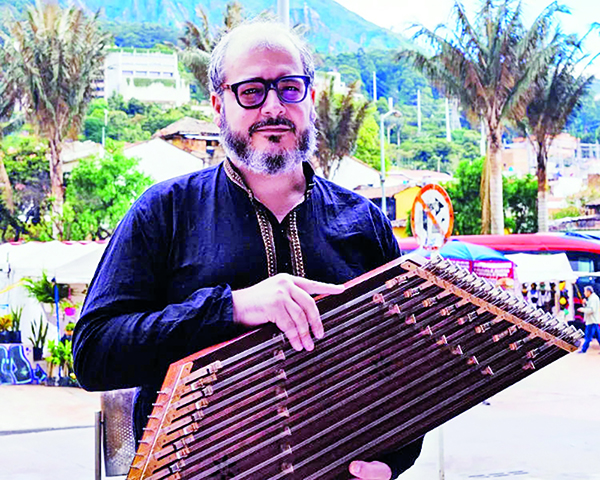General News » News
Amiri brings “ancient tradition and bold creativity” to Aurora with Cultural Centre performance
March 28, 2024 · 0 Comments

As a musician, Amir Amiri is deeply rooted in Persian classical tradition, but what he produces is something altogether new – a blend of classical tradition through a modern lens.
A santur player, composer, and “cultural inventor,” Amiri will bring his ground-breaking style to Aurora next Saturday, April 6, in a concert hosted by the Aurora Cultural Centre at Trinity Anglican Church.
Set to be joined on stage by Nagmeh Farahmand, the Cultural Centre promises a “mesmerizing solo performance as the hammers delicately wander across the trapezoid zither box exploring tradition woven with Amiri’s fresh ideas,” and, on the part of Farahmand, “an acclaimed percussion showcase.”
Amiri came to Canada from Iran in 1996, bringing with him the musical traditions of home which he was then able to interpret through what he describes as a “different cultural operating system.”
“It’s an incredible concept to know what I know, which is deeply Persian classical music, and sift it through this rhythmic mesh,” he says. “What comes out the other side is this sound organization that has been touched by my personal experience, which is rooted in Persian classical tradition. Is it Persian classical music? No. Is it modern music? Yes, but influenced by me and my experience.
“My work is a journey of East and West… where you are from, where you are, and where you’re going to be. That point of reference is very important and that point of reference is that Iranian-ness to my work.”
When you set out on any path, he says, you have the option of going in a straight line – but where you’re from can sometimes dictate the length of that path. In a place like the Middle East where scores of smaller countries are concentrated in one geographic area, these straight lines can be very short.
“When you think of the Middle East as such a huge area… all of these places have their own vocabulary – of course, they all eat humus, but slightly different, and the music is the same. It’s reflective of the food, the person. There is a thread that is very similar, but it also comes with that physicality, and that goes back to the rhythm.”
Amiri likes these in-between spaces where cultures meet. When they do, they enrich each other, he says.
“It’s the human experience and that doesn’t have a boundary,” he says. “We talk a lot these days about borders and things like that, and I am thinking maybe the cultural connection is not as important anymore; it’s more the human connection. We need to start looking at the bigger picture. Everywhere in the world right now, we’re missing something. There’s some really bad stuff happening. My question to myself is, what can I do? What is my responsibility?
“Music in general has a capacity to defragment and this defragmentation comes into different parts of one’s daily life as sort of groupings of allowed agreements… As an artist I appreciate when a human being decides to go to my concert. I think they have done their job. So, for me, I have been trusted by these years of knowledge through music, through classical music, traditional music… allowing this river of energy, allowing this experience to shape together… That is what the power of chamber music is about – music for a room. We’re just together, I’m playing for you and you’re listening. The mistress will do the rest of the job.”
Adds the Aurora Cultural Centre: “Amiri is a master of the santur, a 72-string instrument dating from approximately 500 BCE. Surrounding himself with outstanding collaborators from the worlds of jazz, classical and world music, Amiri fearlessly transcends genres and borders, exquisitely transporting his ancient instrument into the musical conversations of our time.
“Since arriving in Canada in 1996, Amiri has created numerous ground-breaking ensembles including the Amir Amiri Ensemble, inspired by the fluidity of musical influences in Iran and featuring the hypnotic presence of a Whirling Dervish; and Ensemble Kimya, a Montreal-Paris collaboration, combining early classical and contemporary music from Europe, the Middle East and India. Perséides, his duo with double bass player Jean Félix Mailloux, was featured at the National Arts Centre’s Sounds of Persia: Canada’s New Music Masters in 2018, where Amiri was Artistic Director. His ensemble was showcased WOMEX 2021 in Porto, Portugal. Amir Amiri was awarded the 2003 CBC Artist of the Year from the Galaxie Rising Stars Program. He performs and tours with a vast spectrum of ensembles, enchanting with his signature down-to-earth style and profound connection with audiences.”
By Brock Weir
Editor
Local Journalism Initiative Reporter












